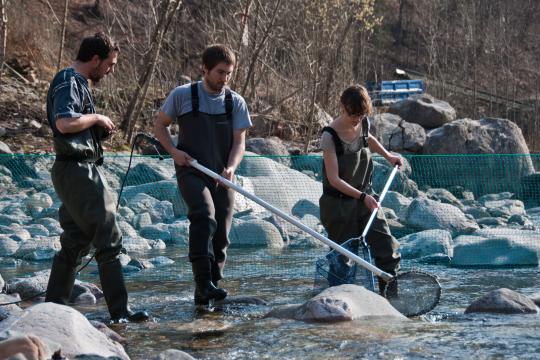Bachelor's degrees

The three-year Bachelor of Science Degree in Environmental Sciences and Technologies (Laurea in Scienze e Tecnologie per l’Ambiente) represents the evolution – with the Master of Science Degree in Sciences and Technologies for the Environment and Landscape – of the five-year undergraduate course in Environmental Sciences, that was activated first in Lombardy and third in Italy in 1991 and still remains unique in the Milan area.
The degree provides essential knowledge and practical skills. To build a solid background in the environmental sciences, students will acquire key knowledge in mathematics, chemistry, physics, biology, ecology, geology and law. The interdisciplinary approach throughout the course ensures that graduates will be able to analyse the environment in its biotic and abiotic components and identify the specific problems of both natural and man-modified environments.
Graduates will acquire a wide range of skills suitable for further study or employment.
These skills include:
- data gathering, information retrieval, information organization and communication;
- ability to work autonomously and as part of a team;
- verbal and written communication skills in Italian and at least another European language.
Graduates with an environmental science background are employed by public agencies and private companies, and are offered technical roles in areas including environmental monitoring, sustainability strategy and policy, land remediation, environmental protection, nature conservation, environmental management, environmental education.
Teaching goals
Undergraduate students will acquire a solid cultural and methodological background in all fundamental disciplines of the Earth Sciences necessary to the handling of a range of scientific and applied geological problems. In particular, we aim at:
1) providing the good background in Mathematics, Physics, Chemistry and Informatics fundamental for a quantitative approach to geological problems;
2) providing a solid geological background based on both theoretical but also practical teachings and training in the field and in the laboratory, aimed at a full understanding of rock types and of the geometry and architecture of rock bodies, of geological processes at different spatial and temporal scales, and on the knowledge required for the production and interpretation of geological and geomorphological maps.
3) providing the necessary background to analyse and characterize rock materials in the field and in the laboratory with both classical and advanced techniques, to illustrate and report the analytical results obtained, and to interpret geological data and processes in an appropriate spatial and temporal context using appropriate methods and software (SIT, database, remote sensing).
Career opportunities
Career opportunities are found in professional companies, service companies, private institutions and public administrations.
The main jobs for the future geologist include the following fields:
- technical and geological mapping;
- data acquisition to prevent geological and environmental risks (earthquakes, volcanic eruptions, floods, tsunamis, landslides, accelerated subsidence, pollution, coastal erosion);
- hydrogeological and geotechnical tests and monitoring activities;
- laboratory analyses for the characterization of rocks, sediments and other incoherent materials;
- sampling and site tests on land and at sea;
- assistance to geophysical campaigns;
- research of raw material of economical value (oil, gas, metal ores, building materials and others);
- research, uses and marketing of ornamental stone materials;
- data collection and analysis for environmental impact assessment;
- collection of geological data for mining activities and recovery of abandoned sites;
- assistance and management of mining and construction sites.
The Bachelor Degree in Geological Sciences and Geo-technologies allows registration to Section B (Junior Geologists) of the Professional register Italian Order of Geologists after passing the state exam.